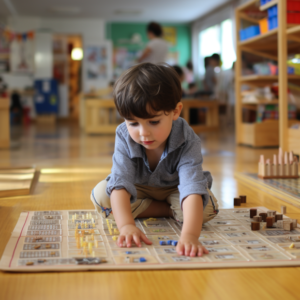In the realm of education, the Montessori method stands as a beacon of innovation, promoting a child-centered approach that nurtures not only academic development but also essential life skills. One such skill that Montessori education excels in cultivating is concentration and focus. The ability to concentrate deeply on a task is a superpower that sets the foundation for effective learning and lifelong success.
The Montessori Environment: A Sanctuary for Concentration
At the heart of Montessori education lies the carefully prepared environment, designed to be a haven for concentration and focus. Classrooms are organized with purpose, featuring child-sized furniture, captivating materials, and inviting spaces that encourage exploration and engagement. The freedom to choose activities and work at their own pace allows children to immerse themselves in tasks that genuinely spark their curiosity, fostering a sense of deep concentration.
The Role of the Montessori Educator
In the Montessori classroom, educators serve as guides, observing and understanding each child’s unique learning style and interests. By offering personalized guidance and tailored learning experiences, Montessori educators create an environment that supports the development of concentration. They act as facilitators, stepping back to allow children to take the lead in their learning journey, fostering independence and self-discipline.
The Three Stages of Work
Maria Montessori identified three distinct stages of work that children experience when fully engaged in an activity. The first stage, known as the “spark,” occurs when a child is initially drawn to an activity or material. The second stage, “deep concentration,” is when the child becomes fully absorbed in the task, shutting out distractions from the environment. The final stage, “satisfaction,” is the sense of accomplishment and joy the child experiences upon completing the activity.
Eliminating Distractions and Promoting Focus
In a world filled with distractions, Montessori education offers a sanctuary where children can cultivate deep focus. Minimizing external disturbances and providing an environment conducive to concentration is essential. By limiting visual and auditory clutter, children can concentrate more effectively on their chosen tasks.
Developing Executive Function Skills
Concentration and focus are integral components of executive function skills, which encompass self-regulation, impulse control, and working memory. Through the use of practical life activities, sensorial materials, and academic challenges, Montessori education effectively develops these executive function skills, laying the groundwork for future success in academic and real-life situations.
Nurturing a Love for Learning
In the Montessori classroom, learning is not confined to rote memorization or the pursuit of grades. Instead, children are encouraged to explore subjects in depth and follow their natural curiosity. This intrinsic motivation to learn fosters a genuine love for knowledge, as children develop a lifelong passion for learning.
Embracing Mistakes and Persistence
In the Montessori environment, children are encouraged to embrace mistakes as a natural part of the learning process. Instead of fearing failure, they are taught to view challenges as opportunities for growth and development. This mindset of perseverance and resilience enables children to stay engaged in their work, even when faced with difficulties.
Conclusion
Montessori education is a powerful catalyst for nurturing concentration and focus in children. By providing a carefully prepared environment, personalized guidance from educators, and opportunities for self-directed learning, Montessori equips children with the tools they need to unlock their innate capacity for deep concentration. As children grow and develop into focused learners, they gain not only academic prowess but also the essential life skills that set the stage for success in all aspects of life.

